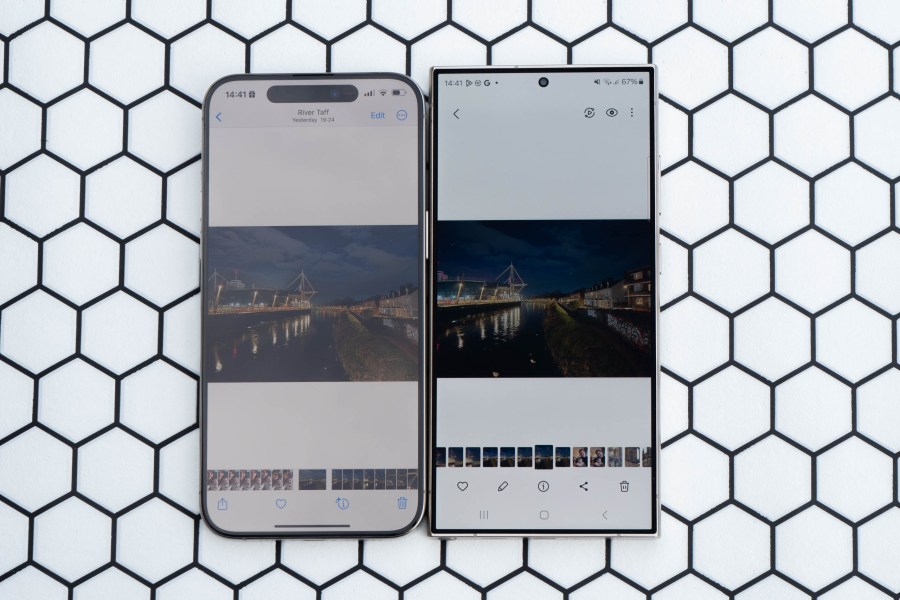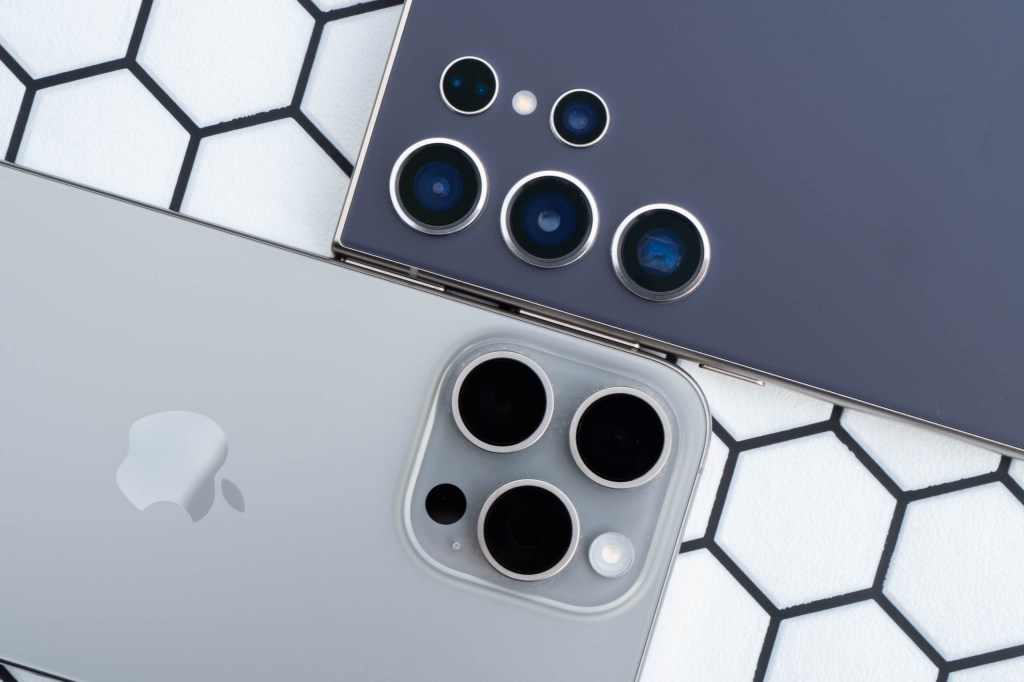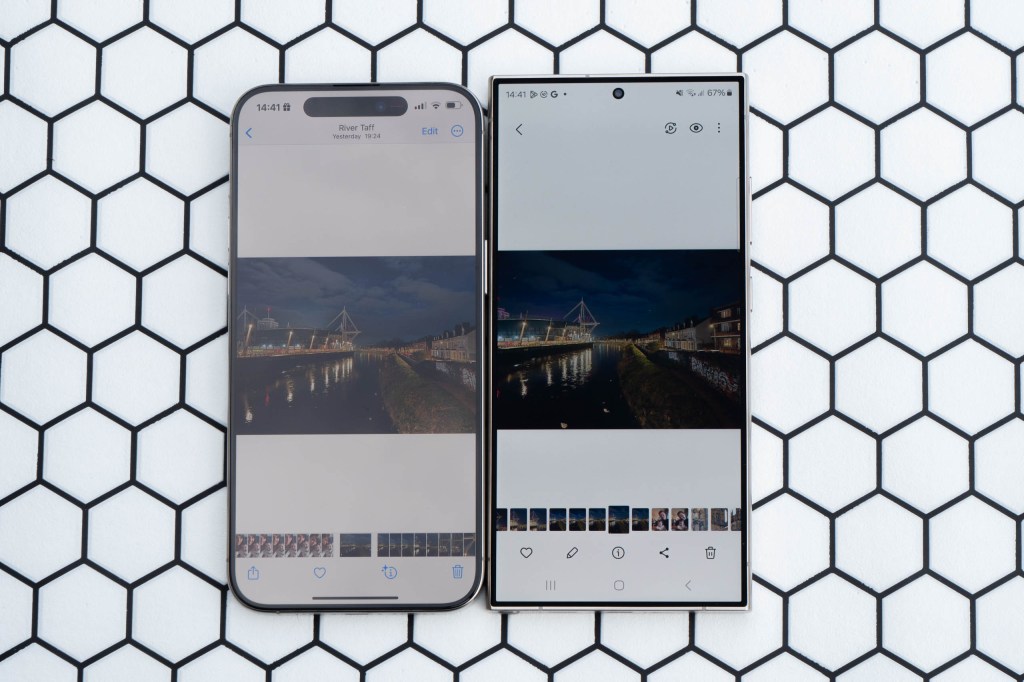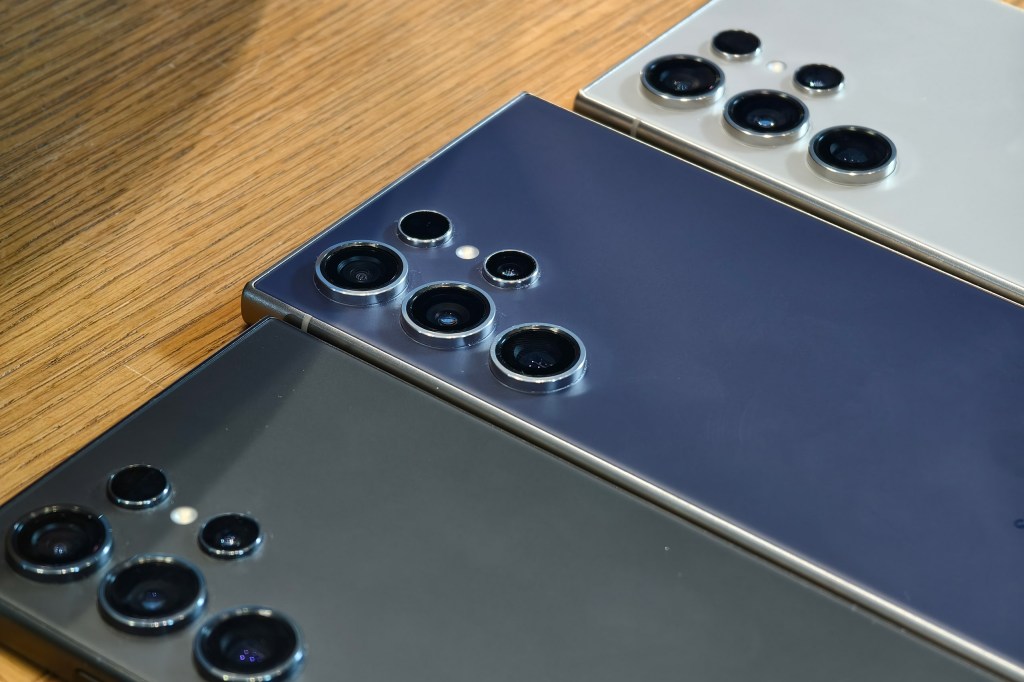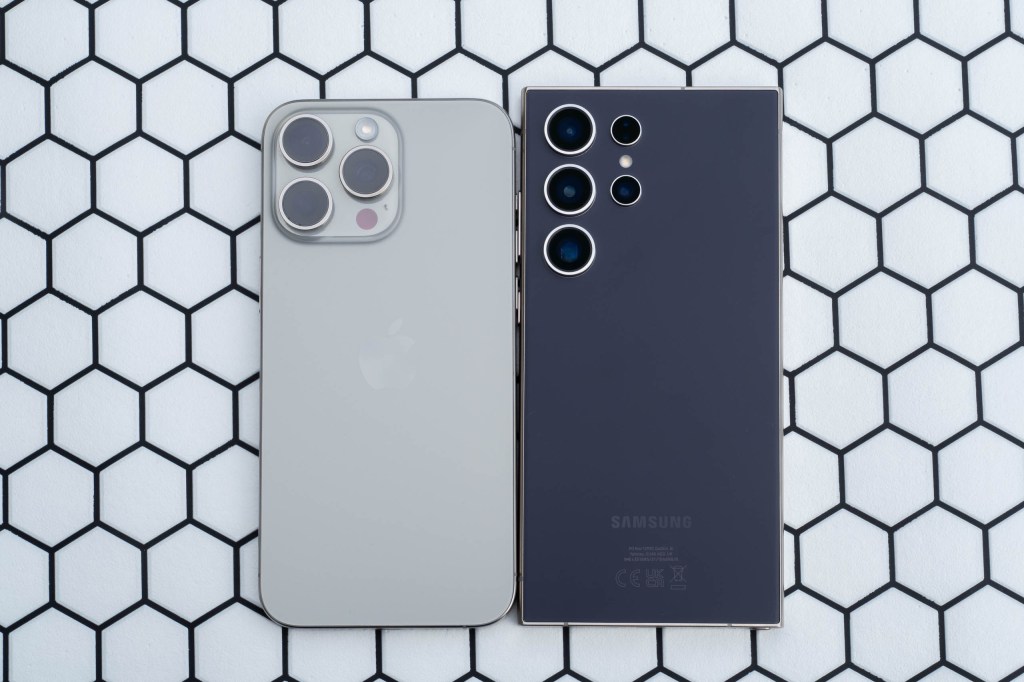Sitting firmly on our list of best smartphones for photographers, the Samsung Galaxy S24 Ultra and the iPhone 15 Pro Max are two of the most popular models you can buy. Despite lots of fierce competition from the likes of Honor, Google and Xiaomi, these two brands tend to be the classic favourites.
The iPhone 15 Pro Max was launched towards the end of 2023, with the Samsung Galaxy S24 Ultra following in March 2024. The two occupy the same space in the market and are likely to appeal to the same type of customer.
Both make a big deal of their photographic capabilities in advertising and marketing, but it’s only by using them both at the same time that we can really see how those specs measure up against each other in the real world.
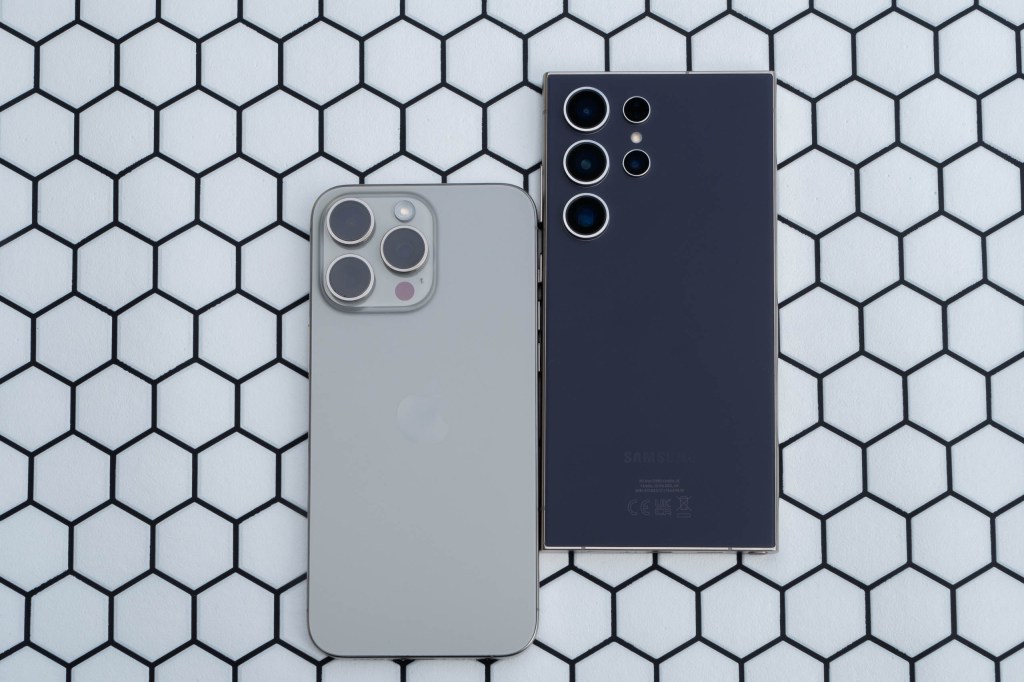
Having reviewed each independently and been impressed by both, we’ve now used them together to capture photos and videos to see how they fare against each other. We also consider other criteria too, such as battery life, body design, storage options and of course price.
Camera specs
Both of these flagship models use broadly similar specifications to their respective predecessors – the iPhone 14 Pro Max and the Samsung Galaxy S23 Ultra – with a few tweaks here and there.
The iPhone 15 Pro Max has three lenses. You get a 48MP standard (1x, 24mm equivalent, f/1.78), 12MP ultrawide (0.5x, 13mm equivalent, f/2.2) and a 12MP telephoto (5x, 120mm, f/2.8). The previous iPhone 14 Pro Max had a 3x zoom, but otherwise the setup here is quite similar. Other “lenses” can be accessed by using the central part of the main sensor, to give you a 1.2x, 1.5x and a 2x selectable option. You can also zoom beyond the 5x lens, up to 25x, digitally.
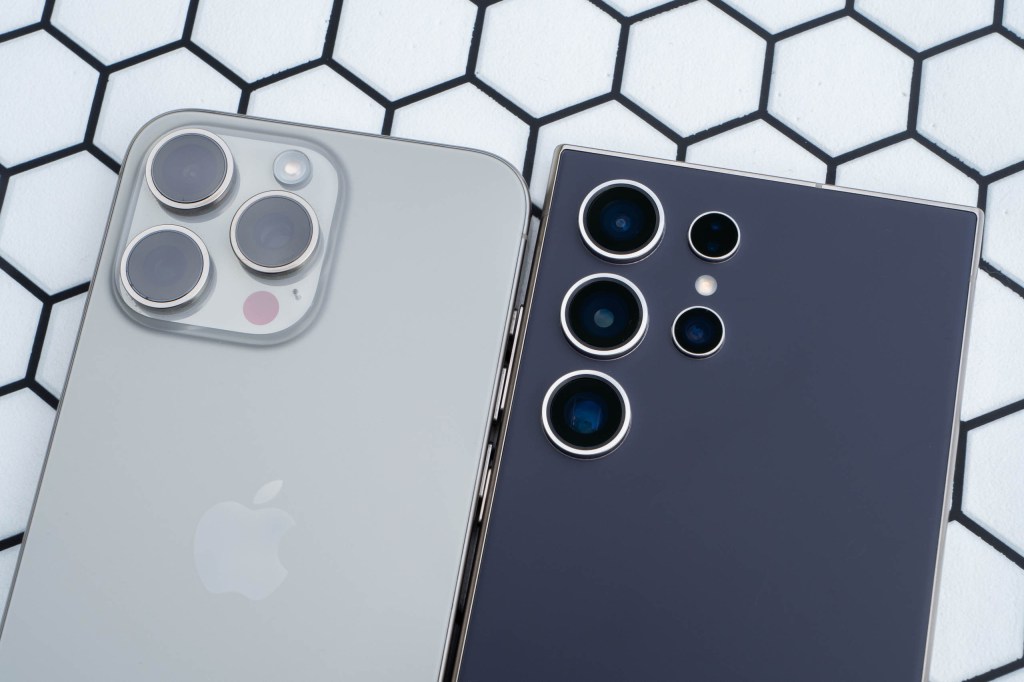
By contrast, the Samsung Galaxy S24 Ultra has four lenses, which is still pretty rare in the smartphone market – the Xiaomi 14 Ultra is another model notable for this.
There’s a 200MP main (24mm equivalent, f/1.7), 12MP ultrawide (13mm equivalent, f/2.2), 10MP 3x lens (67mm equivalent, f/2.4) and a new 50MP f/3.4 111mm periscope lens (5x telephoto). This final lens takes the place of the 10x lens found on the S23 Ultra and is designed to perform better. It having a high resolution sensor means you can still access 10x zoom without too much loss in quality – so it should be a better all-round option. You can zoom here digitally up to 100x – which has been one of the headline specs of the last few Galaxy Ultra models.
It’s worth noting here that the iPhone’s 48MP sensor outputs by default at 24MP, with options available to either reduce that or use the full resolution. The Samsung’s 200MP sensor’s default output is 12MP, with options to use the full resolution in a special mode.
As for video, you get 8K (24/30fps) from the Samsung S24 Ultra, as well as 4K (60/30fps) and Full HD (60/30fps) options also available. By comparison, the iPhone 15 Pro Max’s highest resolution is 4K (60/30fps), with Full HD (60/30fps) options too.
Both phones use a 12MP selfie camera, and both feature autofocus.
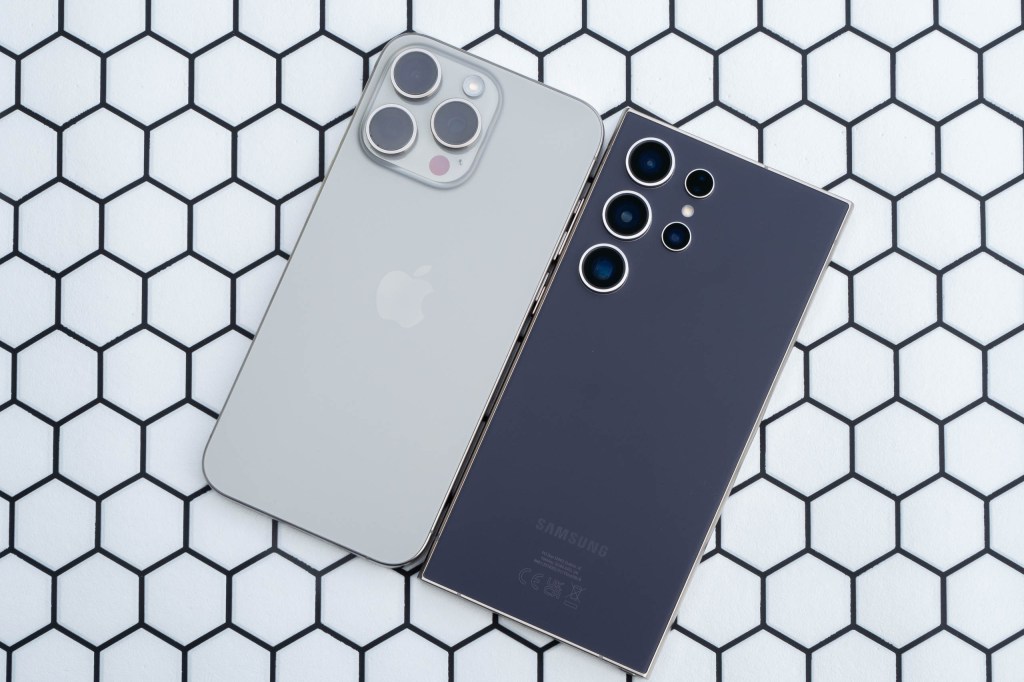
So where does that leave us when picking a winner? On paper at least, it would seem that the Samsung S24 Ultra is the obvious victor here. You get a higher resolution main sensor, and an additional lens. However, with the iPhone 15 Pro Max, that main sensor outputs at a higher resolution by default – which could potentially lead to better results. It’s the real-world shooting that will help us pick out the differences more definitively.
Camera apps and shooting modes
Although there are plenty of third-party shooting apps available, most photographers still tend to use the native camera apps found in their smartphone.
iPhones have been using a fairly simple and straightforward native app for some time. Over the years, additional functionality has been added but there’s still no dedicated “Pro” or “Advanced” mode where you can control things such as shutter speed and white balance.
Meanwhile, the Samsung S24 Ultra has not one, but two “pro” modes, one simply called “Pro” and the other “ExpertRAW” giving even more functionality. With these you can control pretty much all of the same parameters as you’d expect to on a regular camera – with the exception of aperture, which is fixed by the lenses.
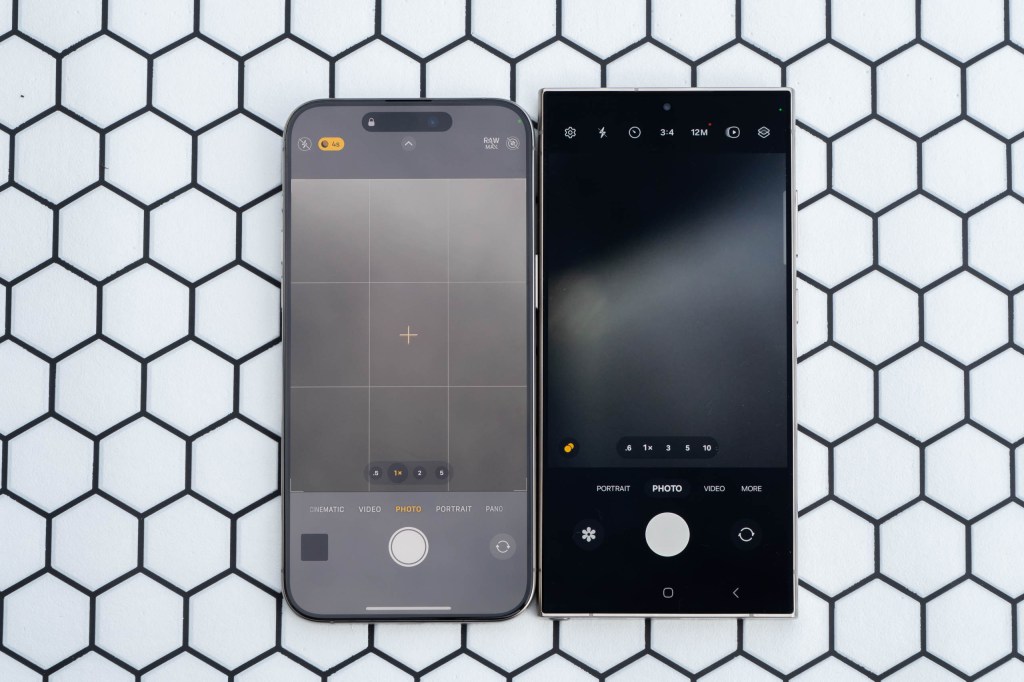
With both apps you also get a default “Photo” mode which is where you’ll probably spend most of your time. With the iPhone you can shoot in raw format (called Apple ProRAW) in this mode, while with the Samsung you can only engage raw shooting if you use the more advanced modes.
Both have other additional shooting modes. An automatic night mode engages with both when the phones detect low levels of light, but the Samsung’s can also be selected manually. Both also have an automatic macro mode – and this time, neither can be manually selected.
As is pretty common now, both have a Portrait mode for creating shallow depth of field effects. A bonus point here for the iPhone, which detects portrait subjects (humans or pets) in the main Photo mode so you can add a portrait effect afterwards if you like.
For video, each has a standard video shooting mode. With the iPhone there is also a Cinematic mode, which creates shallow depth of field videos, as well as Slo-Mo and Time-Lapse. It’s also worth pointing out that you can shoot in ProRes video format, too. For the Samsung, there’s Portrait video, slow motion, hyper lapse, Pro Video, Dual Recording and Single Take – once again showing that Android offers the more comprehensive set of options.
We should mention here the new suite of AI tools for the Samsung S24 series, which is included on the Ultra. Not only does this impact how certain subjects are captured, you can now carry out additional edits after the fact too – such as removing unwanted objects / people from frames, moving and resizing objects and even using generative fill to crop and rotate. It’s a handy tool to use from time-to-time – though it’s worth noting that any edits you make using the AI tool will be watermarked to show that has happened.
Overall, it very much seems like the Samsung is the winner if you crave a more comprehensive feature set, a fully loaded Pro mode and more expansive editing options. However, there are some pretty big ticks for the iPhone too – the automatic portrait recognition and the ability to shoot raw format in the default app are very handy to have. Neither is perfect, so it’s perhaps worth thinking about what it is you’d prefer to have.
General image quality
Both the iPhone 15 Pro Max and the Samsung Galaxy S24 Ultra take great photos in a range of conditions, but particularly so in good light.
We all have our preferences regarding colour tones, but overall the iPhone certainly appears to be a little warmer than the Samsung, but, the Samsung appears more vivid. Both show good colour-matching between their lenses however, which is good news. Both also record plenty of detail, with both using high-resolution sensors for the 1x lens.


Exposure and dynamic range from both models is again pretty evenly matched, with even high contrast scenes displaying a good blend of highlights and shadows.
With scenes where artificial light is present, the iPhone shows slightly warmer tones. In our shot here, both models have “corrected” what was actually extremely yellow lighting in reality to produce results which are pretty similar to each other.


In terms of general image quality, the two models are so closely matched that we might be better off examining specific shooting scenarios to spot the difference.
Zoom
With its extra lens, the Samsung Galaxy S24 Ultra should in theory produce better results than the iPhone 15 Pro Max. However, there’s been a change from the S24 Ultra’s predecessor, in that there is now no 10x lens, but a 3x and a 5x lens, with 10x being provided through cropping.
The 5x lenses from both models are fairly evenly matched, with similar amounts of detail shown from both. At a push, with the iPhone 15 Pro Max we can see a little more detail resolved in the tiling of the roof of the church here in our comparison shots, if you look closely.

Both are now using a crop to produce 10x results, but it’s the Samsung which seems to produce the better results here. This is presumably down to better processing from the new AI tools found in the Samsung model. That’s not to say the iPhone’s 10x option is bad though, they’re both perfectly usable, particularly at small sizes.

The Samsung has the ability to zoom up to 100x digitally. The results aren’t particularly good though, and indeed anything past about 10-15x on either model aren’t really usable for anything beyond pure record shots, so although it’s there as an option compared to the 25x max for the iPhone 15 Pro Max, it’s not really a huge benefit.
Overall here, the two are fairly evenly matched, but the extra lens perhaps gives the Samsung that edge, having two useful telephotos, rather than one.
Low Light
Both models have an automatic night mode that kicks in when the phone detects levels are low. With the Samsung you can also manually activate the mode, too.

Looking at the 1x lens, the two are pretty closely matched, but the S24 Ultra seems to have an overall very slightly brighter appearance. With the ultrawide lens, the Samsung has a touch more detail – although again, both are very good. The 5x lens from the Samsung has a little more clarity than the iPhone equivalent, but, we found it also a little more prone to lens flare too. The Samsung also has a 3x lens, which puts in a reasonably good performance if you’re intending to use or view pictures quite small. The closest equivalent with the iPhone is to use its 2x setting, which uses the central part of the 1x sensor. This produces a marginally more attractive result than the Samsung’s 3x optical lens, but there’s not a huge amount in it.

Overall, it’s quite tricky to pull the two models apart here as both produce great results. At a push, it’s the Samsung which just about fares better if you’re looking quite closely for differences.
Macro
Both phones have an automatic macro mode that activates when you move your camera closer to the subject. Usually, this means if you’re using the 1x lens, when you move closer to the subject, the camera will switch to the ultrawide lens then add a crop. As a result, your macro images can’t be shot with high resolution modes enabled.
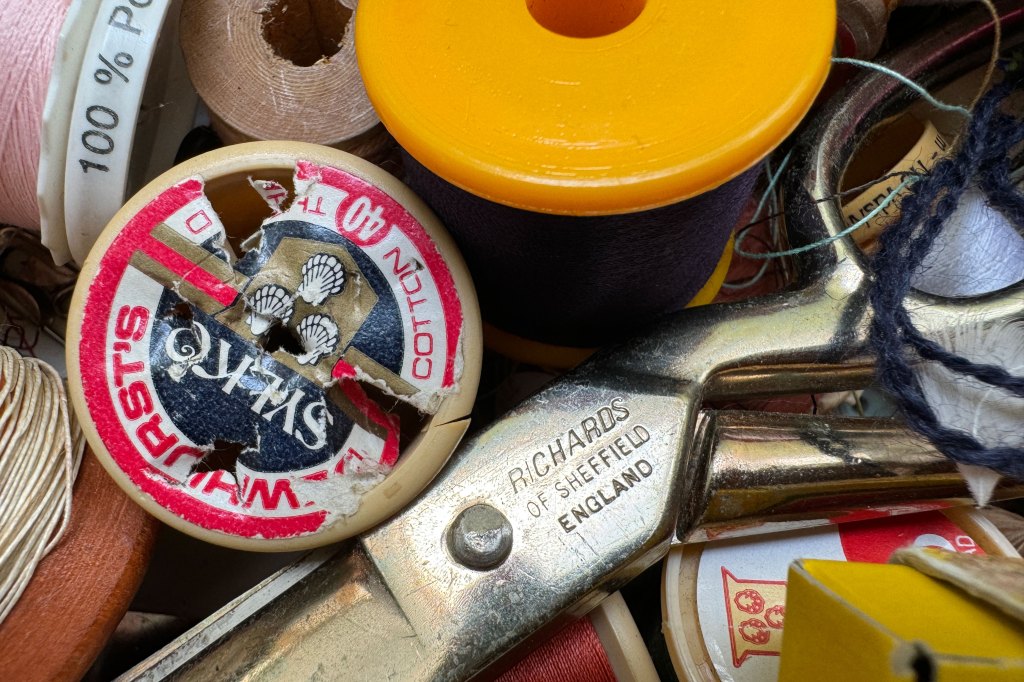
You can switch off macro shooting if you like and therefore keeping shooting with the 1x lens, but you won’t be able to get as close to the subject. Another alternative is to switch to the 3x/5x lens and you should still the macro symbol appear if you get pretty close to the lens, and the camera will likely switch to the 1x lens to shoot with.
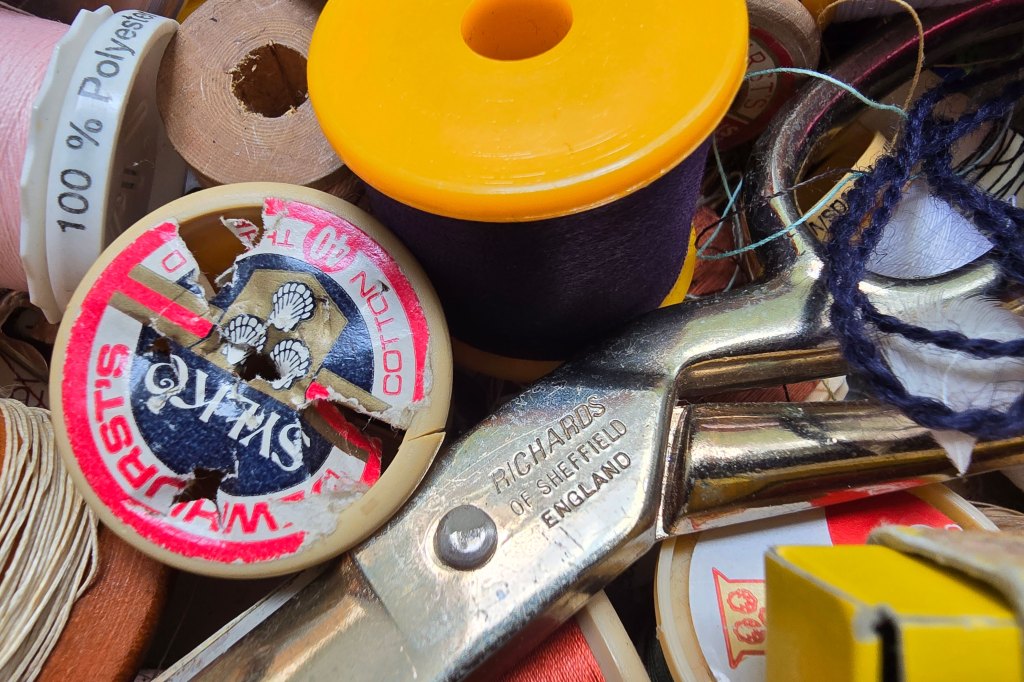
Here the results are pretty tied. Both are good if you want to get nice close-ups, with both displaying a good amount of detail and excellent colours. Here, I was almost touching the scissors in my sewing box to get the shot. There’s a touch more detail in some areas of the iPhone shot, but it’s a very close-run thing.
Portraits
Although both have Portrait modes, only the iPhone will automatically recognise a human or a pet (dog or cat) is in front of it to give you the option to add (or remove) the portrait effect after the fact.

If you’ve shot in Portrait mode with either model you can adjust the focus point afterwards, as well as change levels of blur too. Both put in a very good performance here, doing a fine job of creating a blurred background behind the baby. The Samsung’s background is a little more blurred by default, but the overall exposure of the iPhone is better/brighter. The warmer colours produced by the iPhone are perhaps a little more flattering, but the Samsung’s are probably a little closer to reality than the iPhone.

The outline around the baby’s head has a slightly more natural drop-off with the iPhone, but the more unnatural outline with the Samsung is only really evident when looking at large sizes.
With both models you can also mix Night mode and Portrait mode for low-light portraits. When using the 1x lens you get the best results from both models, with the results fairly even tied. Again, the iPhone produces warmer results than the Galaxy. However, if you select other zoom ratios, then the Samsung does a much better job at 2x, 3x and 5x than the iPhone. It appears the iPhone uses the main lens and crops leading to a much poorer image.


Finally, both models have a selfie camera and both have autofocus. Both can also be blended with portrait mode – although again, with the iPhone 15 Pro Max, it will allow you to add a blurred backgrounds afterwards if you prefer. The selfies created are pretty evenly matched, although the Samsung appears to have “corrected” the glow from golden hour here for a more neutral effect. That said, there’s a more unnatural effect around the hair in the iPhone 15 Pro Max.


Overall here, both models are capable of producing great portraits, being fairly evenly tied but for different reasons. The iPhone pictures are probably more pleasing at the 1x setting, with nicer colours and usually a better outline. They also have the advantage of being available even without Portrait mode being selected – great for grabbing quick shots of subjects which are prone to move without warning (i.e. babies!). However, if you think you might be doing a lot of night-time portraits, then the Samsung is much better.
Video
Both models offer good video specifications, making them great choices both for people who just want to capture quick movies here and there and for those who want to do something more in-depth such as vlogging.
If you want 8K, then you’ll need to go for the Samsung, but it’s unlikely most people will want that desperately. As a result, we’ve compared more closely the 4K/Full HD modes.
Both produce great results at 4K/60fps, giving you a good blend of high-resolution and fast frame rates. Both also give you additional stabilisation options – called “SuperSteady” on the Samsung, and “Action Mode” on the iPhone. Both models have stabilisation as standard for ordinary videos, too.

If you want to shoot videos with a shallow depth of field effect, you can do that with both models – use Cinematic for the iPhone, and Portrait Video for the Samsung.
However, if you want advanced control, only the Samsung has a Pro video mode.
Overall, the two models aren’t worlds apart, but if you crave that additional control within the native app, the Samsung gives more to work with.
Screen and Design
These are both large screen phones, but with its 6.8” screen, the S24 Ultra its larger than the iPhone 15 Pro Max. Both are great for viewing your images, but the Samsung definitely wanders far greatly into “unwieldy” territory and is a little bit harder to use one-handed and for ordinary tasks like email and texts.
If you want to go smaller, then there’s a much bigger sacrifice to be made by going down the line with Samsung. You can pick up the Samsung Galaxy S24, with its more manageable 6.2” screen, but you lose many of the high-end camera specs too, such as the 200MP main sensor, the fourth lens and a macro mode.
By contrast, the iPhone 15 Pro has a 6.1” screen, but the main camera and ultrawide are exactly the same as with the Max. The only difference is you get a 3x zoom lens with the Pro, compared to a 5x zoom lens with the Pro Max. Arguably the 3x is more flexible for most situations anyway so that may not necessarily be a bad thing.
Both the Samsung and the iPhone have IP68 rated bodies for waterproofing and dustproofing. At 3120 x 1440 pixels, the Galaxy S24 Ultra is marginally higher resolution than the 2796 x 1290 pixels of the iPhone 15 Pro Max but looking at them both they’re both pretty similar and show plenty of detail and brightness.
The iPhone 15 Pro Max has a titanium body, with a Ceramic Shield front and textured matt glass back. Meanwhile, the Samsung S24 Ultra also has a titanium body, with Corning Gorilla Armor back and front. Both claim to be an improvement on previous versions resistance to things like scratches. Neither have suffered from any obvious damage while with us and neither have been treated too preciously so that’s a good sign.
Aesthetics wise, the Galaxy S24 Ultra is arguably a little sleeker than the iPhone, which has boxier edges. Then again, you might prefer the look of the iPhone because of this – that’s really a personal choice. The S24 Ultra comes in a few more interesting colours however.
Battery life, charging and storage
Both of these phones charge via USB-C, with Apple finally giving into market pressure to ditch its Lightning cables for the 15 series. Both also have “fast” charging and support wireless charging too.
The Samsung Galaxy has a 5000mAh battery with a quoted life of 30 hours for video playback. Apple doesn’t disclose its battery specs, but has a similar 29 hours of quoted life for video playback too so we can guess it’s likely about the same. With normal usage, they both easily last a full day, and you can sometimes stretch it to two if you’re a bit more conservative with use.
Both also offer the same storage options of either 256GB, 512GB or 1TB, with a price bump for each storage point. You can’t expand the storage with either model.
iPhone 15 Pro Max vs Samsung Galaxy S24 Ultra: Price
Sitting at thee top of these expensive brands line-ups for smartphones means it’s no surprise that both models are highly priced.
Despite its reputation for being unaffordable, the iPhone 15 Pro Max is actually the cheapest model you can buy here, starting at £1,199 / $1,199 for the 256GB version. That compares with £1,249 / $1,300 for the same storage option with the Galaxy S24 Ultra.
However, if you want more memory, it’s the Samsung which is comparably cheaper – in the UK at least. It’ll set you back £1,349 / $1,420 for the 512GB version, compared to the £1,399 / $1,399 price of the 512GB iPhone 15 Pro Max.
Finally if you want an extraordinary amount of storage and opt for the 1TB version, then you’ll pay £1,599 / $1,599 for an iPhone 15 Pro Max, or £1,549 / $1,660 for a Samsung S24 Ultra.
iPhone 15 Pro Max vs Samsung Galaxy S24 Ultra: Verdict
So after all this testing – what’s the result?
Well – as ever, and sorry to disappoint, but the answer is that the two are closely matched, and largely it depends what you want or need from the camera in your phone in order to make a definite decision.
Both are great models, producing excellent pictures in a wide range of situations, so it’s unlikely you’d be disappointed with either smartphone.
If you prefer brighter and more vibrant tones from your images, it might be that the Samsung is your clear favourite. However, if more realistic imagery, and an automatic portrait mode are your thing, then the iPhone would be preferable.
Video is great from both, but as with still images, you get a bit more flexibility from the Samsung with its advanced modes.
Price wise, the iPhone is cheaper at the 256GB point, but the Samsung wins again at 512GB. So, perhaps it comes down to the operating system. iOS fans are perhaps as loyal as Android fans, so if you already have your preference there, then your mind might already be made up.
Overall, if we have to pick a winner – which of course I do because this is a vs piece – then I’d probably just about choose the Samsung Galaxy S24 Ultra. I like having the four lenses, the extra AI tools, and the greater flexibility when shooting. Both are certainly two of the best smartphones for photographers, but, plot twist – I’d actually probably choose neither and opt for the Xiaomi 14 Ultra if I wanted the best of the best, or the Google Pixel 8 Pro if I wanted to save some cash.
Which would you pick?
Related articles:
- iPhone 15 Pro Max vs Samsung Galaxy S23 Ultra: Cameras compared
- Google Pixel 8 Pro vs iPhone 15 Pro Max: Cameras compared
- iPhone 15 Pro Max vs iPhone 14 Pro/Max: Should you upgrade to get 5x zoom?
Follow AP on Facebook, Twitter, Instagram, YouTube and TikTok.

